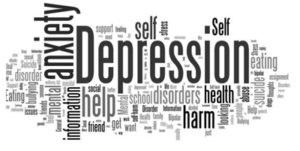The musings of an empathetic mum, teacher, leader and global digital citizen
(aka Mrs V)
PART 10: Children, Technology and Mental Health
 In their 2012 study ‘Technology and Psychological Issues’, the Pew Research Centre surmised that Millennials will both ‘benefit and suffer due to their hyper-connected lives.’ Researchers interviewing technology experts and key stakeholders agreed that those Millennials who best capitalise on new technologies will be able to effectively find and sift through large amounts of information as quickly as possible. However, the flipside of such a capitalisation could very well make this generation impatient, distracted and desperate for constant entertainment.
In their 2012 study ‘Technology and Psychological Issues’, the Pew Research Centre surmised that Millennials will both ‘benefit and suffer due to their hyper-connected lives.’ Researchers interviewing technology experts and key stakeholders agreed that those Millennials who best capitalise on new technologies will be able to effectively find and sift through large amounts of information as quickly as possible. However, the flipside of such a capitalisation could very well make this generation impatient, distracted and desperate for constant entertainment.
Professor Larry Rosen of California State University went so far as to describe this growing mental health concern as the ‘iDisorder’. He goes on to say “an iDisorder is where you exhibit signs and symptoms of a psychiatric disorder such as OCD, narcissism, addiction or even ADHD, which are manifested through your use or overuse of technology.” An obsessive need to check for text messages, a desperate desire to constantly update your Facebook status or a near-addiction to iPhone games are all manifestations of an iDisorder.
With data showing that nearly one in five adults are diagnosed with a mental illness in their lifetime and with the growing evidence linking technology use and overuse to mental health problems in children and adolescents, it is critical that we as parents give careful consideration to prevention, early identification and support for mental health concerns in our children.
 Did you know: that the brain is a constantly changing organ? It is in fact capable of rewiring itself. That is, at a microcellular level, the infinitely complex network of nerve cells that make up the parts of the brain actually change in response to certain experiences and stimuli. When large amounts of unsupervised technology use is added to the highly impacted brain of a teenager, who is already going through rapid brain transformation due to puberty — it is no wonder that at times we see increased bouts of depression, aggression, disconnection and a decrease in empathy.
Did you know: that the brain is a constantly changing organ? It is in fact capable of rewiring itself. That is, at a microcellular level, the infinitely complex network of nerve cells that make up the parts of the brain actually change in response to certain experiences and stimuli. When large amounts of unsupervised technology use is added to the highly impacted brain of a teenager, who is already going through rapid brain transformation due to puberty — it is no wonder that at times we see increased bouts of depression, aggression, disconnection and a decrease in empathy.
Now while this all paints quite a gloomy picture for our children and their ongoing use of technology, I maintain that we need to continue to educate ourselves on how best to continue working with technology, while considering our children’s mental health and well-being. In essence, we must address the development of our children’s Digital Intelligence or DQ rather than throwing out the technology.
It is important that educators, families and health professionals support children to develop skills which will assist in their safe online use, while maintaining a balanced life. IT and digital media competencies are important skills for children to develop. The World Economic Forum has identified eight key skills that make up a student’s DQ. Each skill needs to be carefully taught, reinforced and applied in life.
They are:
- Digital citizen identity: the ability to build and manage a healthy identity online and offline with integrity
- Screen time management: the ability to manage one’s screen time, multitasking, and one’s engagement in online games and social media with self-control
- Cyberbullying management: the ability to detect situations of cyberbullying and handle them wisely
- Cybersecurity management: the ability to protect one’s data by creating strong passwords and to manage various cyber-attacks
- Privacy management: the ability to handle with discretion all personal information shared online to protect one’s and others’ privacy
- Critical thinking: the ability to distinguish between true and false information, good and harmful content, and trustworthy and questionable contacts online
- Digital footprints: the ability to understand the nature of digital footprints and their real-life consequences and to manage them responsibly
- Digital empathy: the ability to show empathy towards one’s own and others’ needs and feelings online
Finally, it is important to remember that in all we teach our children, it is about developmental appropriateness. Conversations regarding each of the eight key areas can occur at every stage and age of life, so long as it is presented at the development pace and understanding of our children.
HOMEWORK for You and your Child
 Watch this Kids Helpline video with your child this week.
Watch this Kids Helpline video with your child this week.
Talk about the sort of feelings they may have, why they may want to talk to someone (and perhaps not you), and that you are always — always — here for them.
Also, consider programing the Kids Helpline number (1800 55 1800) into their phone if they have one.
Over the next two weeks I encourage you to actively seek opportunities to develop your child’s knowledge a little further in these eight key areas. And remember — if you ever have any concerns about your child’s mental health and well-being as affected by technology / online use or any other factor, please seek help. There are many incredible agencies out there that can be accessed directly by you our your child.
 All my love
All my love
♥ Mrs V xox
(Novice Minecraft player, Level 11 Clash Royale Clan Leader, firm but loving digital parent, mistake-maker and Head of Junior School)
References:
http://www.nationalhealthexecutive.com
 SEQTA
SEQTA
